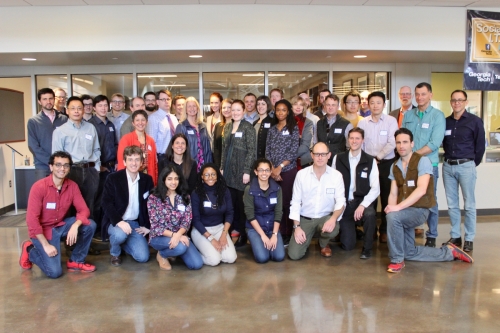March 26, 2018
Kim Cobb
This spring, the inaugural class of Climate Change Fellows begins its work to advance Georgia Tech’s educational and research capacity in climate change. The program is co-sponsored by the new Global Change Program, Serve-Learn-Sustain, the Strategic Energy Institute, Brook Byers Institute for Sustainable Systems, the Ray C. Anderson Center for Sustainable Business, and the Climate and Energy Policy Laboratory, and comprises 43 faculty, staff, and student Fellows from every college.
The new Global Change Program, which formally launches on March 27, 2018 (see list of events here), aims to coordinate and expand Georgia Tech’s climate-related course offerings and research projects. As such, the Climate Change Fellows have formed two working groups – one focused on Education and the other on Research – to identify near-term opportunities for Global Change Program activities. The Climate Change Fellows will convene monthly through fall semester, 2018. Small seed grants funded from a variety of sources will enable small groups of Fellows to partner with other members of the Georgia Tech community to develop new course offerings and research collaborations.
 The Education Working Group, led by co-Directors Kim Cobb (EAS, Global Change Program), Jennifer Hirsch (SLS), and Matthew Realff (ChBE, SEI) is currently working to identify novel ways to engage students in climate change-related activities during their 1st year at Georgia Tech. Possible strategies include the creation of a Global Change-themed GT1000 course, as well as climate-themed modules adapted to large introductory courses across campus. In the long run, the Fellows will deliver a strategy to repurpose the interdisciplinary Energy Systems minor into an Energy and Climate minor, packaging a wealth of cross-campus offerings for easy access to interested students.
The Education Working Group, led by co-Directors Kim Cobb (EAS, Global Change Program), Jennifer Hirsch (SLS), and Matthew Realff (ChBE, SEI) is currently working to identify novel ways to engage students in climate change-related activities during their 1st year at Georgia Tech. Possible strategies include the creation of a Global Change-themed GT1000 course, as well as climate-themed modules adapted to large introductory courses across campus. In the long run, the Fellows will deliver a strategy to repurpose the interdisciplinary Energy Systems minor into an Energy and Climate minor, packaging a wealth of cross-campus offerings for easy access to interested students.
The Research Working Group, led by co-Directors Marilyn Brown (PUBP, CEPL), Michael Chang (BBISS), and Rich Simmons (SEI), kicked off their work with an exercise designed to identify small affinity groups within the cohort using a network analysis of keywords identified by each Fellow. They are meeting in groups of 3-4 Fellows for discussion of research synergies that reflect both short- and long-term aspirations that leverage Georgia Tech’s strengths.
Already, the Climate Change Fellows have benefited from greater awareness of near-term opportunities across the climate and energy space, which are introduced to the Fellows as one-slide lightning talks at the top of each meeting. At its most basic level, this type of cross-college information sharing is a service that the Global Change Program will provide going forward in an effort to lower the barriers to interdisciplinary teaching and research centered on climate solutions.
